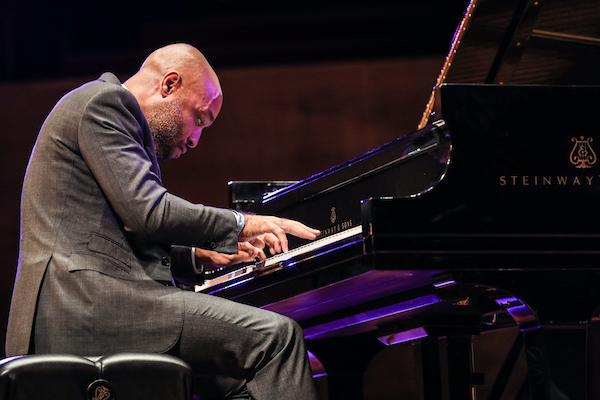Jan 13, 2026 2:09 PM
More Trump-Kennedy Center Cancellations
The fallout from the renaming of the John F. Kennedy Center for the Performing Arts to include President Donald…

The Vagabond merges Aaron Diehl’s jazz background with his increasing interest in the classical world, in part stemming from his work with composer Philip Glass.
(Photo: Mark Sheldon)Still, Diehl admits he had to face his presence as an African American artist in that world. “There’s a lot of underlying racism there,” he said. “I had a lot to prove. I knew I could never play the piece to the level of someone like André Previn, but then I tried to put it into perspective. How many people in that orchestra could sit in at the Village Vanguard and sound halfway decent?”
Diehl received stellar reviews for his performance, which opened up doors for improvising in other orchestral works, including last year’s L.A. Philharmonic mini Harlem celebration at David Geffen Hall that included more Gershwin music: “Rhapsody In Blue” and “Second Rhapsody.” This has inspired Diehl to think even bigger. “I’d like to do a collaboration with a classical composer,” he said while declining to specify who. “I would want him to write a piano concerto for me as a jazz musician. But it’s very difficult to marry the two genres and make it sound organic. This is one aspect of my playing right now. I don’t have it all together yet. It’s not what I want it to be. But sometimes you don’t have all the answers, and you definitely don’t have to pretend you don’t know all the answers. Any great artist will say there’s a lot more to know. That’s all I can say. We’ll see where it goes.”
At the moment, Diehl has made his itinerant existence manifest on The Vagabond. His bandmates are impressed. “Aaron’s so creative without being formulaic,” said 37-year-old Sikivie, a fellow Juilliard alumnus. “He’s always been so voraciously musical with classical being so deeply ingrained in him. You can hear it in his touch. That’s what’s integral to the changes I’ve heard in his playing through all these years. Playing swing with Wynton left a big mark on Aaron, broadening his territory in the dichotomy between traditional jazz and art-jazz.” He said that Diehl acted with “mental fortitude” in their “game of endurance” through Prokofiev’s “March From Ten Pieces For Piano, Op. 12” and loved Diehl’s “low-key and haunting” take on Hanna’s melody, “A Story Often Told, Seldom Heard.” He added, “Since I’ve known him, I’ve seen him continually maturing as a performer and composer.”
A resident of Rome, Italy, for the past six years, 49-year-old Hutchinson said, “Aaron is smart. He’s learned a lot from the generation before him—Bill Charlap, Benny Green, Brad Mehldau—but he’s come up with his own voice that has an urgency in every note he plays. That’s rare to come up with at such a young age. You could tell how deep he was into playing Sir Roland Hanna’s piece. He has so much more to say in all the various ways he plays the piano.”
Diehl said he’s still learning, though: “I feel like I have a high calling. I’m not slumming it. As I’m getting older, I’m listening more to music that’s on the outskirts of what I would normally listen to. ... It’s never going to hurt you to listen to anything. You may not like it, but it won’t hurt you. I see Philip Glass as an example—to listen to him and see what you can take from him in all your encounters.”
He then reflected on the loss of his friend and longtime partner Leathers, who was murdered last year. “It was a big blow,” Diehl said. “He gave me a chance at his Smalls jam sessions. What I learned from Lawrence was how to cut through all the superficial barriers. He was a person who made everyone—from downtown to uptown—feel like an original. He helped me with how to listen to and support people. That’s how posthumously he played a big part of The Vagabond.”
Diehl recognizes he has a full future. “I’m confident in my journey,” he said. “I have no idea where I’m going. That’s the big question mark. But I know at some point I’ll die. So, with that kind of assurance, there’s really nothing to worry about.” DB

Belá Fleck during an interview with Fredrika Whitfield on CNN.
Jan 13, 2026 2:09 PM
The fallout from the renaming of the John F. Kennedy Center for the Performing Arts to include President Donald…

Peplowski first came to prominence in legacy swing bands, including the final iteration of the Benny Goodman Orchestra, before beginning a solo career in the late 1980s.
Feb 3, 2026 12:10 AM
Ken Peplowski, a clarinetist and tenor saxophonist who straddled the worlds of traditional and modern jazz, died Feb. 2…

The success of Oregon’s first album, 1971’s Music Of Another Present Era, allowed Towner to establish a solo career.
Jan 19, 2026 5:02 PM
Ralph Towner, a guitarist and composer who blended multiple genres, including jazz — and throughout them all remained…

Rico’s Anti-Microbial Instrument Swab
Jan 19, 2026 2:48 PM
With this year’s NAMM Show right around the corner, we can look forward to plenty of new and innovative instruments…

Richie Beirach was particularly renowned for his approach to chromatic harmony, which he used to improvise reharmonizations of originals and standards.
Jan 27, 2026 11:19 AM
Richie Beirach, a pianist and composer who channeled a knowledge of modern classical music into his jazz practice,…